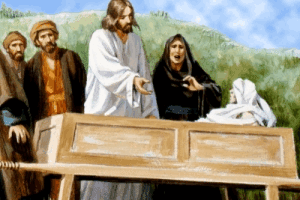 “When the Lord saw her, he was moved with pity for her and said to her, ‘Do not weep.’”(Luke 7:13)
“When the Lord saw her, he was moved with pity for her and said to her, ‘Do not weep.’”(Luke 7:13)Vulnerable, destitute, defenseless—the situation of a widow in ancient times could be heartbreaking. Without a husband to protect and provide for her, a widow faced danger and poverty. This is why throughout the Hebrew Scriptures, God reminded his people to go out of their way to look after widows. A widow’s great comfort, of course, was a son if she had one. Filling the role of provider and protector in the place of his father, a son could guarantee safety and security. But what would happen if a widow’s only son died?
We meet two such widows in today’s readings. Staying in the house of a widow, Elijah begged God to bring life back to her son. And in the Gospel reading, Jesus interrupted a funeral procession to bring a young man back to life and give him back to his widowed mother. The reaction after each miracle was enthusiastic and hopeful: surely God was with his people! He had come to help the weakest and most vulnerable!
Whether or not we are widows, these readings tell us something important about God. Have you ever felt vulnerable or defenseless? Have you ever felt powerless in the face of circumstances outside your control? God cares! He who raised up the widow and orphan cares for you! He looks on you with compassion and says, “Do not weep” (Luke 7:13) .
God’s heart is moved when he sees you in a difficult situation. In fact, when you can’t rely on your own powers or abilities, he can draw you even closer to his side. So let God care for you today. Let him into the situations where you feel the least in control: an illness, a job loss, the challenge of starting over after the loss of a spouse or child. Ask your Father to walk with you, put his arm around you, and take care of you.
“Lord, in my vulnerability, I ask you to come close to me and show me your love. I trust in your protection!”
1 Kings 17:17-24; Psalm 30:2, 4-6, 11-13; Galatians 1:11-19